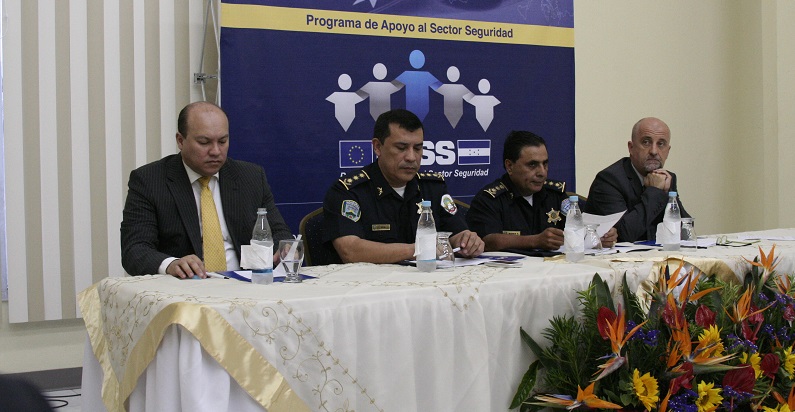-
14 July 2014
Category : Opinion
Nineteen lives
Honduras has eight million inhabitants. Ninety-five percent of them feel threatened by the criminality affecting the country. There, according to the Violence Observatory at the National Autonomous University of Honduras, 19 people die each day as a result of violence and crime. After years without success in reducing this figure, the country has plunged into a new effort with the “Security Sector Support Programme” (PASS)of the European Union (EU), in which the FIIAPP participates.

Ten years ago, the homicide rate in Honduras was 30 per one hundred thousand inhabitants. According to official statistics, it is currently 86. This represents an increase of over 200%. Driven in large part by the uncertain future faced by young people in a country in which two thirds of the country’s population subsists in poverty, this violence and criminality not only translates into homicides but also into other types of crimes such as extortion. Up to now, the public policies developed in Honduras to address this problem have been not been effective and criminal acts have not been adequately prosecuted.
“Young people have a high level of unemployment, and in response to this sensation that there is no future in the country and that nothing can be done here,the escape valve—summarizing perhaps too much—for a young man is illegal immigration to the United States or the possibilities offered by crime: money in the short run”, explains Francisco de Asís López Sanz, the director of the technical assistance team the FIIAPP is providing to the PASS. With this programme, Honduras is confident that the national security institutions will be strengthened and that the country’s security sector reform will be supported.
Something needed considering that the population has opted to rely on private security systems, which the poorest inhabitants cannot afford; as a result, they end up being affected the most by crime. “There’s a high rate of extortion, which popular opinion blames on street gangs, but taxi drivers and shopkeepers have also corroborated that they have to pay the police the corresponding ‘mordida’ (bribe) if they want to operate their businesses on a day-to-day basis”, explains the FIIAPP expert.
For this problem, generated decades ago and having different origins, to subside, it will be necessary to wait a generation or two, according to Francisco de Asís. “The government would have to engage seriously with measures to promote a correct distribution of income”, he emphasizes. “There is a high rate of tax evasion and money laundering, very low rates of education and also a high index of violence of a political nature and against journalists, in addition to an increase in murders of women”, adds the expert about the factors working against social harmony.
Training to combat crime
Along these lines, the FIIAPP is providing Honduras, through the PASS programme, with experts who are training judges, prosecutors and police officers for the purpose of strengthening judicial processes and security in the country. This has resulted in the development of 15 courses which have been given between the start of the programme (2011) and this July.
The Deputy Attorney General of Honduras, Rigoberto Cuéllar, told the FIIAPP that the justice sector in the Central American country lacks credibility. “There’s only one way to guarantee this point, and that is through training processes, both initial and ongoing, and a system of subsequent specialization for each of its members”, he indicates. This type of training, based in large measure on practical approaches, became paralyzed in Honduras a decade ago.
One of these courses was “Criminal Law and Criminal Procedure” directed at 650 prosecutors from the Honduran Public Ministry, 30 judges and 30 police officers, who were trained on the need to preserve evidence and to not obtain it at any cost or by any means. Also, how a prosecutor should approach a case in a trial and how to prosecute it, among other subjects. “Something that’s not taught in universities or in books”, Cuéllar emphasizes. In terms of the Prosecutor’s Office, this course has enabled it to assess its situation in the country. “Drawing on the lessons learnt can serve the Deputy Attorney General of Honduras when taking decisions regarding what his staff’s needs are, their weak points and how to properly reassign jobs”, explains FIIAPP expert Francisco de Asís.
The PASS programme, financed with nine million euros from the EU and one million from Honduras, is another step towards this desired generational transition that will reduce violence. Now we will have to wait for it to bear fruit in the hope that this figure of 19 lives lost per day is not seen again.
The views and opinions expressed in this blog are the sole responsibility of the person who write them.






